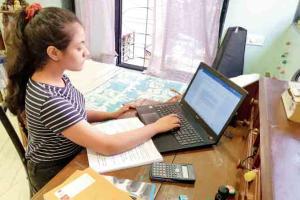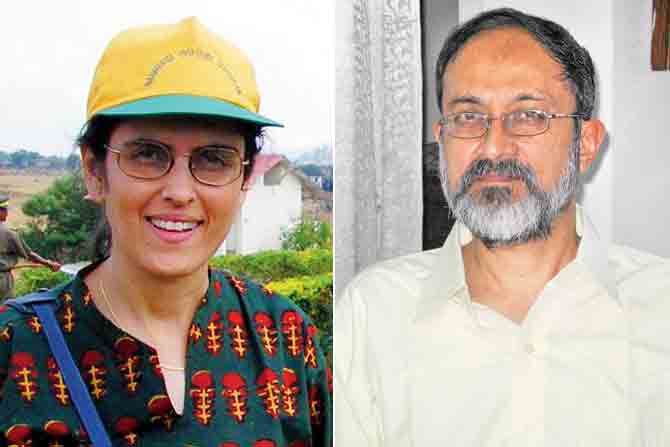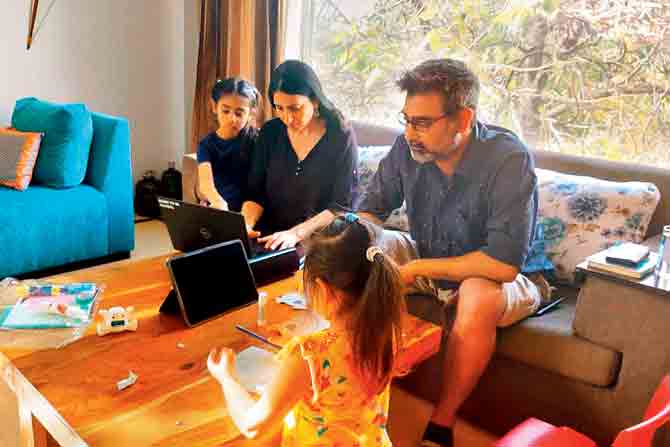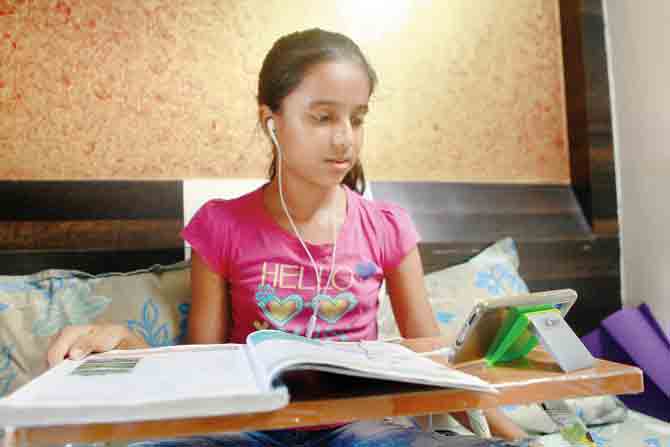The shut down of schools means that a giant education technology experiment in various avatars is unfolding as teachers, families and children grapple with e-learning. But, is the determination to keep going making us over-zealous?

Photographer Shiv Saran's daughter Ananya is a Class X student at NES International School, Mulund. He says the daily online classes give her a routine so that she's not needlessly in front of the television or phone all day
A class IX project on Celebration of Nature in Ancient Indian Literature for students of Lilavatibai Podar High School ISC in Santa Cruz, asked the kids to draft a conclusion that discusses how rampant destruction of the environment for economic gains will leave us poorer, and how Indian texts including the Panchatantra, Jataka Tales and the Vedas in fact, carry within them lessons for co-existence.
Given that scientists around the world are urging governments fighting the Coronavirus outbreak to look closer at the connection between climate change and pandemics, and have highlighted how destruction of wildlife habitat and transporting commodities and people from one part of the world to another, is largely responsible for the emergence of new pathogens (microorganism that can cause disease) that we have no immunity to, the school project might just impress upon young minds the critical need to conserve nature.
ADVERTISEMENT
In a normal academic year, Sheela Lalwani's daughter would have managed this assignment with ease, says the mother. But in a month when the country is reeling under a lockdown to contain the virus outbreak, and children are studying from home, it has come as a challenge. Although the students were given a generous 20 days to submit the fully-handwritten project, they were expected to juggle it with daily classes on the Zoom app and a Formative Assessment (FA) exam that started the same day the assignment was due for submission.
![Content editor Payal Gupta’s children aged 10 and 13 go to Delhi Public School, RK Puram, and are busy most days attending online classes. “While the school and teachers have put in a lot of effort with the videos, nothing beats traditional schooling. Here, we [parents] have to be around them, especially if their attention span is limited, to ensure they have understood a concept,” she says](https://images.mid-day.com/images/images/2020/apr/oc-b.jpg)
Content editor Payal Gupta's children aged 10 and 13 go to Delhi Public School, RK Puram, and are busy most days attending online classes. "While the school and teachers have put in a lot of effort with the videos, nothing beats traditional schooling. Here, we [parents] have to be around them, especially if their attention span is limited, to ensure they have understood a concept," she says
"It's been 15 days since the new term began, and we have the FA scheduled. My child is at the computer from 7.30 am to late evening for online classes, and to complete the projects. It is unnecessary pressure at a time like this. Why not slow down? We are in a crisis and everyone is struggling to keep afloat," Lalwani says.
While the school accepted late submissions despite no formal announcement of relaxing the deadline, an email that some parents say they have written to management, acknowledged the effort put in by them to have the online set-up running overnight and well made instructional videos, but it's the pace that the parents are questioning. Not every student can be up to speed, and when assignments are sometimes left pending and the posting of chapter-wise videos continues, the kids are left stressed about mounting work.
A member of the senior management at an ICSE school said that not all parents are aware of the volume of teaching that happens at school, and now that it's unfolding in front of them, they are overwhelmed. "I think parents must just be parents and not try to become teachers. The teachers are already doing a fine job, even in testing times," she says.

Radhika Bapat, clinical psychologist
Meera Isaacs, principal of Cathedral and John Connon School, Fort, says she is glad that the circumstance that we find ourselves in is giving parents the chance to appreciate the importance of teachers and their role in the schooling system. About the future, she thinks that if schools are going to have to incorporate distancing in class, it might require operating in shifts with a lower number of kids in each. "But then there are only so many hours in a day and it would take away the whole fun of the schooling experience."
With schools following the ICSE/ISC and IB programme, already functional, and SSC schools traditionally given to re-open after the summer break in mid-June, parents and academicians are concerned about the impact of the lockdown on education this academic year, and eventually on the mental health of children.
On March 13, most schools in the city were shut down following growing concerns around the spread of the virus. Within the next 10 days, a national lockdown was announced, adding parents with professional jobs and businesses to the lot of people restricted within the walls of their home.
As a measure to tide over the crisis, the administration of most schools decided to fall back on digital learning, Microsoft Teams, Google Classrooms, Whiteboard, Schools App and Zoom to conduct classes every morning like they would during a regular term in classrooms.

Dilbur Parakh, chairperson, Aseema and Dr Shailesh Shirali, principal, Sahyadri School, KFI
Since then, attendance is being marked, instructional videos are shared, worksheets are uploaded, projects are assigned and assessments are tagged. An entire school system has been moved to the Internet. Overnight, parents have turned into home-teachers, and teachers have had to think on their feet about rustling up courses and resources as part of one of the world's biggest educational technology experiment or what in India is colloquially called jugaad.
Entrepreneur Payal Kothari's children are studying in the sixth and ninth grade at Aditya Birla World Academy, Tardeo, respectively and are busy with online classes from 8 am to 2 pm. Kothari sees this as a positive move since they are engaged in constructive learning for a large part of the day, but she wonders if this system is for everyone. "What about the distracted lot? Online learning works well for the diligent student but some might find it hard to focus and could look for excuses concerning log in issues and device lags. It might be an interim solution given the severity of the problem on hand but isn't sustainable in the long run."
Photographer Shiv Saran's daughter Ananya is a Class X student at NES International School, Mulund. He is satisfied that learning is continuing and therefore, the syllabus won't be compromised. "The daily online class provides a routine to the students. My daughter can plan her day instead of being in front of the television or on social media longer than needed. The classes also allow continued social interaction with classmates and teachers," he thinks. Refusing to handle older students with kid gloves, he in fact, sees the crisis as an opportunity for the young to learn coping mechanisms, and "manage with limited resources". His only grouse: it's problematic that long hours online restrict physical movement through the day, since older students are in front of the screen for almost six hours straight.

Prachi Buchar's daughters aged three and six, attend a school in Delhi that rests on a no-exam policy. She finds herself in a fix, now having to oversee homework, especially from an institution that relies on free play and concept based learning, which she admits she doesn't have the bandwidth or expertise to monitor
In Spain, left wing mayor of Barcelona and mother of two, Ada Colau has been spearheading a social media campaign to free the country's young after the government announced a lockdown on March 14, with mental health experts, doctors and educators arguing that a child's ability to deal with anxiety and stress while restricted indoors is limited. Spain has seen over 20,000 COVID-19 deaths and the lockdown is expected to stretch into the middle of next month.
Mumbai-based clinical psychologist Radhika Bapat says online learning brings with it long hours of screen exposure, less face-to-face playtime, and fewer resources for the kids to manipulate with their hands, all of which are essential to cognitive development. "On the other hand, time is a precious commodity and they are saving time otherwise spent on commuting to and from school, and therefore gaining more leisure hours and sleep," she says, adding, "In the long run, we might be tempted to look at a hybrid-model [of online learning and in-class sessions]."
There is also the question of school administrations trying their best to compensate for a 'lost' chunk of the term, especially those that charge high fees and are expected to provide world class education backed by cutting edge technology.
While most schools in Mumbai announced that they would be promoting students upto Class VIII directly to the next class, IB schools, one of the most expensive in the city, have decided to keep the term running via online classes until it ends next month. A teacher at an IB school who didn't wish to be identified for this story, says, "The school's prelim examinations were on when the lockdown was announced. A quick online meeting later, the management and teachers took the decision to continue classes online. The fees are too high for parents to come to terms with kids idling away at home."
But not all parents are buying the argument.

Mahi Solanki, a Class IX student of Sane Guruji English Medium School, studying science at home. Pic/Ashish Raje
Working mothers and fathers are having it the hardest. In addition to managing the cooking and cleaning in the absence of house helps, and meeting their own professional targets, they have had to devote a fair chunk of their day helping the children with assignments and homework.
Public Policy Manager, Bytedance, Prachi Bhuchar finds herself in an ironic situation. She says she chose to enrol her daughters at the IB Diploma Programme at Shiv Nadar School in Noida, because of the institution's no-exams policy. But in the current study-from-home scenario, she is having to juggle her professional commitments with school work for her daughters aged three and six.
She says, "Honestly, I don't have the bandwidth to do it. Then again, you don't want to come across as a bad parent, so you are pressured into it. Parents of schools that have homework might be able to cope better, but at our school where learning is based on freeplay and the students don't have tests till Class VI, it comes as a shock that you need to be that invested in what your child does on a daily basis." For her younger daughter, Vedika, who has just joined the school and is yet to meet her teacher and classmates, it is difficult to respond to a group of people on a laptop screen whom she doesn't really care for. The older daughter, Saira, is in Class I and is used to concept-based learning. "That makes it difficult for me because they are trying to teach things like music and movement, theatre, and what a gratitude jar is. These aren't tangible things to teach. As teachers, they are very invested, but for a parent, this can be tough. As and when I have time, I send the assignments and have informed the in-charge at the school," explains Buchar, who puts in a nine-hour office day. "Every meal is a production. As a parent, I have no choice but to sink or swim, and at this point, I am okay if I sink. I need to keep my sanity."
For parents who feel overstretched, Bapat, who is also a mother, says, "Understand that this situation is outrageous. Our idea of normal has changed, and therefore it is completely okay to feel overwhelmed. Once you stop beating yourself about feeling that way, you can start working on healthy coping mechanisms like role play, imagination, distraction and humour. Use these when frustrated, apart from good music."
But she agrees that it would help if schools considered taking a step back. While academic goals are important, they have little value if the environment at home is toxic. "There are financial, logistical and caregiving concerns that everyone is dealing with. At the same time, parents need to temper their ambitions. Some push schools to commit to what was promised at the beginning of the term. We need to work together as a community and not look at it as us versus them," she suggests.
The Sahyadri School in Pune is a Krishnamurti Foundation institution where the stress is on inquiry, because knowledge and technological prowess alone have never been sufficient to meet life's challenges, says the school website. Its principal, Dr Shailesh Shirali, terms the online classes an ad-hoc solution, a sub-optimal way of accessing a lecture. "While it does have its advantages of being able to access a whole lot more than a lecture in a class; I believe in the importance of the human contact in education. Schooling is a way to look at yourself."
Those working towards education for all will argue that the online learning model, dependent on access to the Internet and laptops, is skewed in favour of the privileged. And it's true of first world countries too. A report in The Guardian dated April 13 says that students in some of the US without net access have been forced to look for free WiFi around their towns. A school in Texas, it said, allowed students to park in its football stadium and access the WiFi hotspot while a Miami Dade County school distributed over 80,000 laptops to its students.
Dr Shirali sees it as discriminatory. "Our country has resource limitations and it is not allocated in places where it is most required, especially education."
Shoaib Hashmi, principal, Millat High School, Jogeshwari, says before burdening his students with vacation classes, he must ensure they are safe and the family has the means to sustain itself. "The better-off, educated parents are going to look up online textbooks anyway. It's the others we must look out for especially. We will cover the syllabus when schools reopen and figure how we can conduct extra classes. We will cross the bridge when we come to it," he says.
Shama Taraporewala is the principal of Anjuman Islam, an Urdu school located at Belasis Road. She has created WhatsApp groups for each class, and separate ones to address extra curriculars like art and essay writing. They are using the Schools App for Class X to IX, where teachers are recording the lesson videos. "While they have ebooks and scanned pages, most students have complained that they don't have notebooks to write in and stationery shops are shut. We've asked them to use empty pages from last year's notebook for tests and assignments. Honestly, the idea is to keep them engaged during the lockdown. Once they return to class, we will revise what's being covered now anyway thereby benefitting anyone who may have missed the online learning for any reason," she says.
The crisis has also highlighted the role that schools play outside of education. "When we tried to find out why a few of our students weren't active on the WhatsApp group, we learnt that their families were struggling to survive. Attending an online class wasn't on their mind; survival was. Through a non-profit, we managed to send across ration to the families and it had us realise the number of children who rely on school for food and a safe environment," says Taraporewala.
Dr Shirali feels the system is questionable not just on account of unequal access, but lack of training too. "If you don't know how to learn on your own, how to manage your time, if you don't have any intrinsic motivation, you won't be very successful in this environment. What the government needs to do is, in a coordinated effort—reach out to the best lecturers in the country to have standardised, rich content created that is quality controlled."
It's a first then, not just for parents but school teachers and principals too. The IB school teacher says that in the first week of going live, a few classroom videos from her school were leaked on Instagram and made the round of TikTok with sarcastic and critical comments. "It was a breach of trust [to have posted an internal lesson video on social media]. The management intervened immediately and the videos were deleted but these acts can harm the teacher's esteem. In the current scenario, we are going out of our way to help the students. The last thing you want is to be made fun of on a public platform."

Shama Taraporewala, principal, Anjuman Islam and Shoaib Hashmi, principal, Millat High School, Jogeshwari
The pandemic has also exposed how and where this ad-hoc solution by ed-tech can fail. Being online, doesn't give the teachers a true sense of student engagement. In an online class, the audio quality varies, the network speed can fluctuate. For schools to succeed, teachers will also need access to training and support. "The way I look at it is that the teachers are showing the students how nothing is impossible. Of what it means to take a risk with something new. For once, we are amateurs too. But, it's okay, we are learning," she says.
When the storm of the pandemic passes, schools may either be revolutionised by this experience or revert to the tried, tested and trusted ways. What is evident is that several city schools are woefully unprepared to move online. Is there a body to supervise the digital revolution in education the government has been keen on? Earlier this month, Maharashtra Education Minister Varsha Gaikwad, held a meeting with education officials to discuss a learn-from-home programme. It was suggested that the syllabus be provided to the students via television and radio and e-content designed should be delivered jointly by Balabharti and SCERT. Gaekwad did not respond to calls and messages from mid-day until the time of going to press.
Dilbur Parakh, chairperson, Aseema, an NGO that looks after the education of underprivileged through schools run by the BMC and a school for tribal children in Igatpuri, suggests that certain public schools should be identified where limited learning can continue provided staff and children's safety is ensured. "I doubt all schools in the country will be fully operational before the end of the year. With the way things are currently looking, there are plans of converting BMC schools into temporary quarantine centres. Thankfully, we have the month of May to put our plan into action of working with students when schools reopen. Our students have reached out to the teachers saying they are bored and would like to continue learning during lockdown. About 70 per cent of them have access to smartphones and limited internet; hence we have to design courses through easy-exchange models like online worksheets that don't require printing, and low-resolution videos that are easy to download and won't consume bandwidth," Parakh shares. The goal is to provide some semblance of education to them, even if for two hours a day. "They too need to be able to exercise and experience their right to education as well. However, besides academics, our focus will also be on creating content that inspires them to be good human beings, by covering subjects such as love, compassion and harmony—an important virtue in today's time."
(Some names in the article have been changed or withheld on request)
Catch up on all the latest Crime, National, International and Hatke news here. Also download the new mid-day Android and iOS apps to get latest updates.
Mid-Day is now on Telegram. Click here to join our channel (@middayinfomedialtd) and stay updated with the latest news
 Subscribe today by clicking the link and stay updated with the latest news!" Click here!
Subscribe today by clicking the link and stay updated with the latest news!" Click here!







